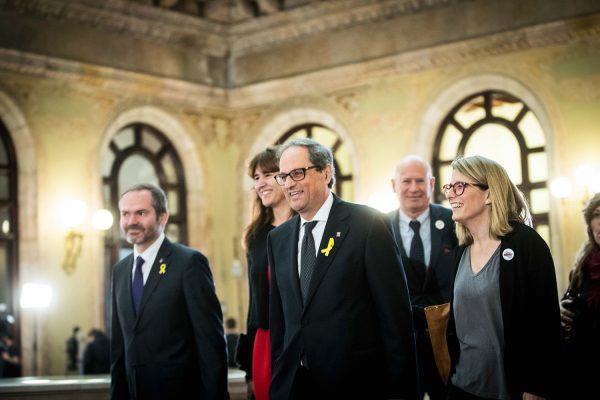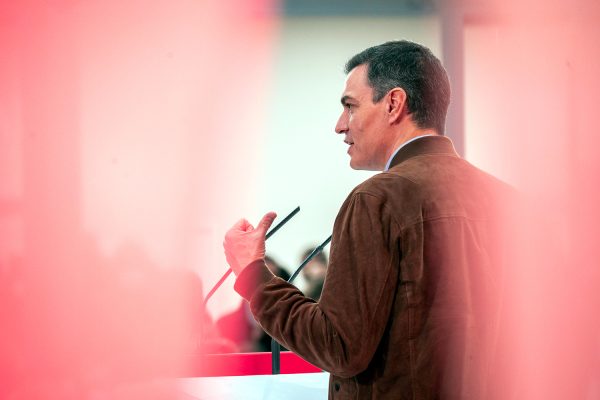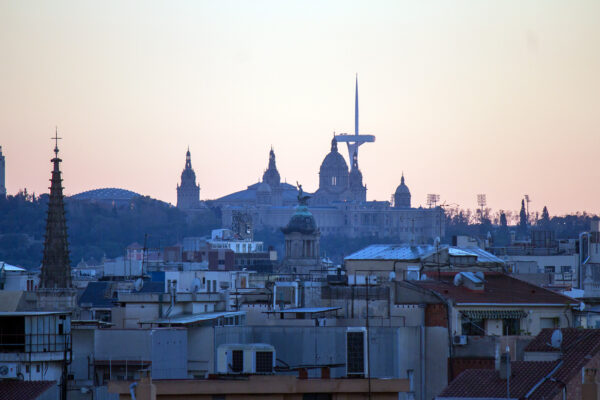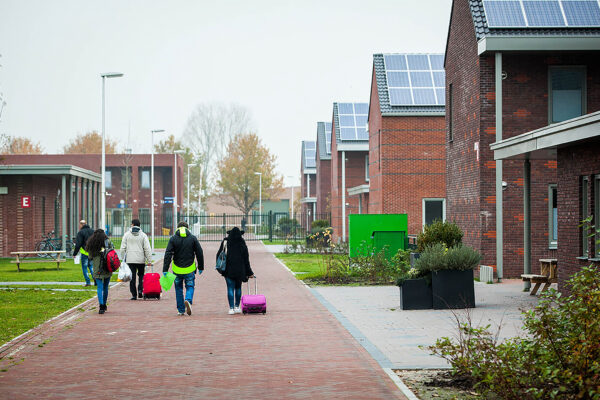Joe Biden got more done than many anticipated at the beginning of the year. The consequences of Germany’s and the Netherlands’ shortsighted energy policies became obvious with the Russian war in Ukraine. Right-wing Spain waged lawfare against the left-wing government of Pedro Sánchez and its Catalan allies. Farmers’ protests broke out in the Netherlands. Emmanuel Macron lost his parliamentary majority in France. Social democrats lost the election in Italy. Democrats only half-won the election in the United States because Republicans are worse, but the largest group of Americans is disappointed in both parties.
Here are the best Atlantic Sentinel stories of 2022.
Give Joe Biden a Break

President Joe Biden ends the year on a high note, but eleven months ago the media decided he was failing. I didn’t share the analysis. In his first year, the Democrat enacted a $1.9 trillion coronavirus recovery plan, more than twice the size of Barack Obama’s 2009 stimulus, and a $1 trillion infrastructure bill of the type Donald Trump was unable to get through Congress in four years.
Biden also paused federal student debt payments, ended the separation of migrant families at the border, reversed Trump’s ban on transgenders serving in the military and rejoined the Paris Climate Agreement. Some failure. Read more
Germany Exports Its Energy Failures

This was an expectedly prescient story, written a few weeks before Vladimir Putin dramatically expanded his war in Ukraine. Germany had asked the Netherlands to raise gas exports to meet higher-than-usual demand that winter, but the Dutch balked. Drilling for gas in the border province of Groningen, including to heat German homes, was causing violent earthquakes.
It was one consequence of Germany’s shortsighted energy policy. The country phased out coal and nuclear simultaneously, but solar and wind could not make up the shortfall. So Germany imported electricity generated in even dirtier coal plants in Poland as well as natural gas from the Netherlands and… Russia. Read more
Catalans Bear Brunt of Spanish Judicial Activism

Conservative Spain escalated its lawfare against the left-wing government of Pedro Sánchez this year, which relies on Catalan separatists for its majority in Congress. Opposition parties filibustered the appointment of progressive judges. The Supreme Court upheld prison sentences for artists who “glorified” terrorism and insulted the king. A left-wing member of the Catalan parliament was removed from office for displaying a yellow ribbon, a symbol of the Catalan independence movement, in his office.
The Catalans were canaries in the coal mine. In the week before Christmas, the conservative majority on the Constitutional Court took the unprecedented decision to block a Senate debate about reforms to the court’s composition. Spain enters the new year with a crisis in its institutions unseen since the return of democracy. Read more
Spain’s Casado Flirted with the Far Right and Lost

Pablo Casado’s resignation as People’s Party leader was a long time coming. What finally felled the Spanish version of Ted Cruz was a shouting match over money with the popular governor of Madrid, Isabel Díaz Ayuso. The reason such a minor squabble could lead to his ouster was that the right had tired of Casado’s opportunism.
Casado took a hard line on abortion, Catalan autonomy, Gibraltar and immigration when a far-right party, Vox (Voice), popped up — and presided over the People’s Party’s worst electoral defeat ever.
Casado U-turned, calling Vox “ultra-right” and meeting with Prime Minister Pedro Sánchez, whom he had previously accused of “treason”, to discuss a common strategy for Catalonia.
When this didn’t help the People’s Party in the polls, Casado U-turned again, going back to accusing Sánchez of treason for pardoning Catalan separatists and seeking deals with Vox. His party has stuck with this strategy (see below), but it realized it wouldn’t be able to sell it to voters with Casado anymore. Read more
Dutch Ignored Warnings About Relying on Russian Gas

Germany wasn’t alone in underestimating the dangers of relying on Russian gas. The Dutch government was warned repeatedly through the years — by its own experts, by outside consultants, by the European Commission and by the United States — against giving Russian gas such a central place in its national energy strategy. It did so anyway.
Only when Russia dramatically escalated its war in Ukraine did most Dutch political parties agree the country had to stop buying Russian gas. They should have paid more attention in the past. I spoke with some of those outside consultants, and read the many relevant government reports going back to 2005, for this most thoroughly researched story of the year. Read more
Sánchez Can No Longer Ignore Catalonia

Spanish judges aren’t the only ones who have it out for Catalonia’s independence movement. In April, it emerged that at least 65 politicians and leading activists had their phones tapped, almost certainly by Spain’s National Intelligence Center.
The revelation put pressure on Prime Minister Sánchez to make good on his promise to give the region more autonomy. (He didn’t.) Read more
What Conservative Spain Has in Common with Putin

Why can’t conservative Spain live with an autonomous, let alone independent, Catalonia? I drew a parallel with Vladimir Putin, who couldn’t accept an independent Ukraine in 2022.
Putin understands that a free and prosperous Ukraine would serve as a rebuke to autocracy in Russia. Right-wing Spaniards feel similarly threatened by the prospect of an independent, liberal Catalonia.
Insecure nations lash out. The next best thing to respect is fear. The next best thing to self-worth is to hurt others. It’s the logic of the schoolyard bully. As long as Russia, which has an economy the size of Spain’s, can dominate Ukraine, it is still a great power that must be reckoned with. As long as Spain controls Catalonia, its economy, population and landmass make it one of the great nations of Europe. Read more
Biden’s Housing Policies Are Steps in the Right Direction

One of the quiet successes of the Biden Administration have been its housing program. Especially ending discrimination against prefabricated homes and encouraging local zoning reform.
Home building has not kept up with demand. Estimates of the shortage range from 1.5 to 5 million. Young Americans are one-third less likely to own a home than their parents and grandparents at the same point in their lives. Black homeownership has fallen to its lowest in six decades.
Among the causes: prefabs were ineligible for government-backed mortgages and restrictive zoning laws make it hard to build anything anywhere. Biden has fixed the first and is fixing the second by giving jurisdictions that loosen their zoning regulations extra federal transportation funds. Read more
Spain’s People’s Party Hasn’t Turned the Page

The People’s Party got rid of Casado, but not his strategy. The new party leader, Alberto Núñez Feijóo, promised moderation, but he just says the same things in a softer voice.
He insists Spain is “not a plurinational state.” Many Catalans do consider themselves a nation inside Spain.
Feijóo accuses Catalan schools of “linguistic apartheid” for teaching primarily in Catalan.
He gave his blessing to regional coalitions with Vox, a party that would criminalize Basque and Catalan separatism, recriminalize euthanasia, lift the ban on gay “conversion therapy” and “reconquer” Spain from Muslims. Read more
The Netherlands’ Farm Crisis, Explained

Farmers’ protests broke out in the Netherlands this summer against a plan to cut ammonia emissions in half. One in three Dutch livestock farmers might be forced out of business in order to meet EU environmental protections.
In this best-read story of the year, I explain the roots of the crisis, analyze the arguments for and against the government’s policy, and give more reasons for Dutch farming to change. Read more
The Center Did Not Hold in France

Emmanuel Macron won reelection in 2022, but he lost his majority in the National Assembly. In the short term, the French president will have to rely on the center-right opposition to get his plans through. Long term, the outcome calls the longevity of the French Fifth Republic into question.
When Charles de Gaulle replaced parliamentary with presidential democracy, and proportional with two-round voting, in 1958, he channeled France’s three political traditions — a radical left, a moderate center and an authoritarian right — into two major parties. Macron, by reuniting social democrats and liberals, has restored the moderate center, and banished the radical left and authoritarian right to permanent opposition. French history suggests this center cannot hold. Read more
How Politicians Keep Making Bad Drug Laws

One of my frustrations in debating drug policy is that proven experiences and studies make so little impression on proponents of repression. What is a pragmatic question of harm reduction to me is a moral crusade to them.
Whether it is the city of Amsterdam proposing to ban tourists from buying weed legally, despite polls suggesting they would buy it illegally rather than forego cannabis.
Or Republican state governments in the United States shutting down needle exchanges, which lower drug use in public and reduce hepatitis and HIV infection rates.
Or only 29 states allowing pharmacists to sell the life-saving drug naloxone to patients who are at risk of an overdose.
President Biden, to his credit, has raised funding to treat addicts. He claims to support evidence‐based harm-reduction strategies, like drug tests and needle exchanges. But state laws get in his way. Read more
Democrats Taxed and Regulated, Now Subsidize, Chips and Energy

The major legislative accomplishments of the Democratic Congress were the $369 billion Inflation Reduction Act and the $50 billion CHIPS and Science Act. Both contain good policies: a 15-percent minimum tax on the largest corporations, lower out-of-pocket drug payments for Medicare patients, higher funding for scientific research.
But — here I put on my free-market-fundamentalist hat — both laws also spend billions of dollars in subsidies and tax credits to prop up technologies and industries that could have been deregulated instead to produce the same outcomes. Read more
How the Left Lost the Italian Election

Italy elected its most right-wing prime minister in postwar history in September: Giorgia Meloni. I analyzed the failure of the Italian left, which isn’t so different from the failure of the left elsewhere.
The Democratic Party leader, former prime minister Enrico Letta, married a mildly technocratic, middle-of-the-road social democracy with a passionate defense of abortion, gay and immigration rights, which failed to impress voters. The politics of social justice may appeal to the twenty-something-year-olds who staff Democratic Party campaigns, but how does it help the unemployed single mother in Campania? Read more
Don’t Turn Cultured Meat into a Culture War

I have high hopes for cultivated meat. Livestock farming is a major emitter of greenhouse gasses and, in its “factory” form, cruel to animals. Yet convincing consumers to reduce their meat intake is slow going. Meat grown from animal cells could be the solution.
Unfortunately, some meat eaters are easily triggered. There is already a backlash against vegetarianism. Cultivated meat must avoid being seen as “woke”. Read more
Biden Would Repeat Dutch Mistakes in Regulating Freelancers

The most exciting news of the year for someone was the United States Labor Department releasing draft guidelines for the regulation of freelancers. Being self-employed myself, these attempts to overregulate work irritate me. Most freelancers are doing just fine.
I made a comparison with the Netherlands, where a previous government similarly attempted to regulate freelancing and failed. Read more
Where Is the Party of Middle America?

The fact that Democrats half-won the midterm elections in November, which are usually lost by the incumbent party, should be a warning to Republicans: they are still too extreme for centrist voters.
Democrats aren’t far behind, though. One in two Americans believe the left would “defund the police” (possibly the worst political slogan ever imagined).
A growing share of Americans — 40 percent of the electorate, 52 percent of millennials — identifies with neither party. Who will speak for them? Read more
Europe’s Asylum Crisis, Explained

Figures for the first nine months of 2022 suggest that most, and possibly all, EU member states will match their 2015 records, when 1.3 million people applied for asylum in the bloc. I took a deep dive into the numbers before checking how three member states cope with the high influx: France, Italy and Netherlands. Read more
